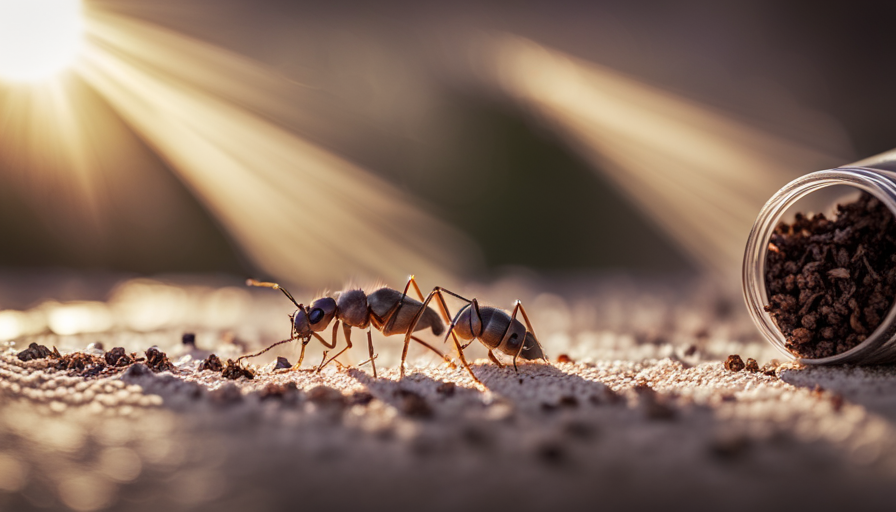Are you aware that small ants can infest your home in large quantities? In reality, a single ant colony can include thousands of individual ants! If you have ever faced the annoyance of handling these troublesome insects, you are not alone. However, do not worry, as I am here to provide some efficient tactics on how to eliminate small ants in your house.
First things first, it’s crucial to identify the type of ants you’re dealing with. This will help determine the most appropriate course of action. Once you’ve identified the ants, locating and eliminating their trails is essential. By disrupting their scent trails, you can disrupt their communication and navigation.
Keeping your house clean and tidy is also key in preventing ant infestations. Ants are attracted to food and water sources, so ensuring that you clean up spills and store food properly is essential. Additionally, sealing cracks and openings in your home can prevent ants from entering.
If natural repellents and commercial ant sprays or powders don’t do the trick, it may be time to consider calling professional pest control. These experts have the knowledge and resources to effectively eliminate ant infestations.
Preventing future infestations requires persistence and patience. By following these strategies and staying vigilant, you can successfully get rid of tiny ants in your house and keep them at bay.
Key Takeaways
- Identifying the type of ants is crucial for determining the best course of action.
- Disrupting ant trails can disrupt their communication and navigation.
- Keeping the house clean and tidy is essential in preventing ant infestations.
- Sealing cracks and openings in the home can prevent ants from entering.
Identify the Type of Ants
Now, let’s figure out what kind of ants we’re dealing with, so we can have a little fun getting rid of them! Understanding ant behavior is key to effectively eliminating them from your home.
Different species of ants have different habits and preferences, so identifying the type of ants you have is crucial. Common ants found in houses include odorous house ants, pavement ants, and carpenter ants.
Odorous house ants are attracted to sweets and can leave a distinctive smell when crushed.
Pavement ants, on the other hand, are known for building their nests in cracks and crevices, often near sidewalks or driveways.
Carpenter ants are larger and can cause structural damage to your home by excavating wood for their nests.
Once you’ve identified the type of ants, it’s time to explore effective home remedies. For odorous house ants, placing a mixture of borax and sugar near their entry points can be effective. Pavement ants can be deterred by sprinkling cinnamon or coffee grounds around their trails. As for carpenter ants, locating and eliminating their nest is crucial. This may require professional help if the infestation is severe.
Understanding the behavior of the ants and using effective home remedies will help you combat these tiny invaders. Let’s now transition to the next section and learn how to locate and eliminate the ant trails.
Locate and Eliminate the Ant Trails
To effectively address the issue, it’s important to identify and eliminate the trails left by those pesky little ants. Ant trails are the key to finding their nest and eliminating the source of the problem.
So, how can you disrupt these ant trails effectively?
First, start by observing the ants and tracking their movement. Look for lines of ants marching in a straight path. These trails are usually found near food sources, so check around the kitchen and pantry. Once you’ve located the trail, wipe it clean with soapy water to erase the pheromone scent left by the ants. This will disrupt their communication and confuse them.
If you can’t locate any ant trails, don’t worry. You can still take action. Place ant baits near areas where you’ve seen the most ant activity. These baits contain insecticides disguised as food, which the ants bring back to their nest, effectively eliminating the colony.
Now, let’s transition into the next section about keeping your house clean and tidy. By maintaining a clean home and eliminating food sources, you can prevent ants from returning and ensure a pest-free environment.
Keep Your House Clean and Tidy
One way to maintain a delightful and pest-free home is by ensuring it stays clean and tidy. Keeping a clean house is essential in preventing ant infestations. Proper food storage is of utmost importance as it helps to eliminate potential food sources for ants. Make sure to store all food in airtight containers and clean up any spills or crumbs immediately. Regular vacuuming also plays a crucial role in preventing ant infestations. By regularly vacuuming your floors and carpets, you can effectively remove any food particles or crumbs that may attract ants. Additionally, vacuuming helps to eliminate ant trails and disrupt their communication.
To emphasize the importance of cleanliness and tidiness in deterring ants, consider the following table:
| Importance of Proper Food Storage | Role of Regular Vacuuming in Preventing Ant Infestations |
|---|---|
| Proper food storage eliminates potential food sources for ants. | Regular vacuuming removes food particles and disrupts ant trails. |
| Storing food in airtight containers prevents ants from accessing it. | Vacuuming helps to maintain a clean and crumb-free environment. |
| Cleaning up spills and crumbs immediately reduces the chances of ant infestations. | Regular vacuuming disturbs ant communication and prevents them from establishing trails. |
In order to completely eradicate ants from your home, it is also crucial to seal cracks and openings, which will be discussed in the subsequent section.
Seal Cracks and Openings
If you think leaving cracks and openings in your home is a great way to invite ants for a never-ending party, then you’re absolutely right! These tiny pests can easily find their way into your house through even the tiniest of openings. That’s why it’s crucial to take the necessary steps to seal cracks and block openings in order to keep ants out.
To effectively keep ants at bay, here are some tips for repairing cracks and blocking openings:
- Inspect your home thoroughly for any cracks or openings. Pay close attention to areas around windows, doors, and pipes.
- Use caulk or silicone-based sealant to fill in any visible cracks or gaps. This will create a barrier that ants cannot penetrate.
- Install weatherstripping around doors and windows to ensure a tight seal.
- Place screens on windows and vents to prevent ants from entering through these openings.
By repairing cracks and blocking openings, you’re creating a fortress against ants and minimizing their chances of invading your home. With these measures in place, you can significantly reduce the number of ants inside your house.
Now that you’ve sealed off potential entry points, let’s explore the next step: using natural repellents.
Use Natural Repellents
Now that you’ve sealed off those pesky little cracks, it’s time to discover the power of natural repellents in keeping those unwanted ants away from your cozy abode. Natural repellent options offer a safe and effective way to deter ants without the use of harmful chemicals.
There are several homemade ant deterrents that you can easily make with ingredients commonly found in your kitchen. One popular natural repellent is a mixture of vinegar and water. Ants dislike the strong scent of vinegar, so spraying a solution of equal parts vinegar and water along their trails and entry points can help keep them at bay.
Another option is to create a barrier using essential oils such as peppermint, lemon, or tea tree oil. Mix a few drops of your chosen oil with water and spray it around windows, doors, and other areas where ants may enter.
Additionally, cinnamon and coffee grounds are known to repel ants. Sprinkle these substances near ant trails and entry points to discourage them from coming inside. These natural repellent options can be effective in preventing ants from invading your home.
Now, let’s move on to the next step and set up ant baits to further eliminate these tiny pests from your house.
Set Up Ant Baits
Ready to take down those pesky invaders? It’s time to lure them into a trap with some irresistible ant baits! Using alternative ant baits is an effective and eco-friendly way to eliminate tiny ants from your house. Here are some DIY ant bait recipes that you can easily make at home:
-
Sugar and Borax: Mix equal parts of sugar and borax and place it in small containers near ant trails. The sugar acts as bait, attracting the ants, while the borax acts as a poison, killing them.
-
Borax and Peanut Butter: Combine equal parts of borax and peanut butter to create a sticky bait. Ants are attracted to the peanut butter and will carry it back to their colony, ultimately eliminating them.
-
Vinegar and Water: Mix a 50/50 solution of vinegar and water and spray it around areas where ants are commonly seen. The strong smell of vinegar disrupts their scent trails, making it difficult for them to navigate.
-
Dish Soap and Water: Create a soapy water solution and use it to wipe down surfaces and clean ant-infested areas. This disrupts the ants’ communication and removes their pheromone trails, deterring them from returning.
-
Cinnamon: Sprinkle cinnamon powder near ant entry points or areas where they are frequently seen. Ants dislike the strong smell of cinnamon, making it an effective repellent.
Using these alternative ant baits can help eliminate tiny ants from your house without the use of harmful chemicals. Once you’ve successfully dealt with the ant problem using baits, it’s time to explore the next step: using commercial ant sprays or powders to ensure complete eradication.
Use Commercial Ant Sprays or Powders
To completely eradicate those pesky invaders, it’s time for you to unleash the power of commercial ant sprays or powders! While there are alternative DIY ant control methods available, commercial ant sprays and powders can provide a quick and effective solution to your ant problem.
These products are specifically formulated to target and eliminate ants, offering a convenient option for homeowners. However, it’s important to be aware of the potential risks and side effects associated with commercial ant sprays or powders. Some sprays contain chemicals that can be harmful to humans and pets if not used properly. It’s crucial to carefully read and follow the instructions provided by the manufacturer to ensure safe usage.
Additionally, some individuals may be sensitive or allergic to the ingredients in these products, so it’s advisable to test a small area before applying them extensively. Considering these factors, it’s essential to weigh the benefits and risks before using commercial ant sprays or powders. If you have concerns about safety or prefer a more hands-off approach, consider calling professional pest control. They have the expertise and knowledge to effectively handle ant infestations while minimizing risks to your household.
Consider Calling Professional Pest Control
If you’re tired of battling the ant invasion on your own, why not let professional pest control swoop in like superheroes and save the day? Hiring professionals to handle your ant problem can be a game-changer.
These experts have the knowledge, experience, and tools to effectively eliminate ants from your home. So, put your feet up and let them take care of it!
Here are a few reasons why you should consider calling professional pest control:
-
Expertise: Pest control professionals are trained to identify the type of ants infesting your house and determine the most effective treatment plan.
-
Targeted Approach: They use specialized products and techniques that specifically target ants, ensuring that the infestation is eradicated at its source.
-
Long-term Solutions: Professionals not only eliminate the current ant problem but also provide recommendations to prevent future infestations.
While DIY methods might seem tempting, they often provide temporary relief and fail to address the root cause of the problem. Professional pest control offers a comprehensive solution that saves you time, effort, and frustration.
By hiring professionals, you can say goodbye to the tiny ant invaders and hello to a pest-free home.
But how can you prevent future infestations? Let’s find out in the next section.
Prevent Future Infestations
Now that you’ve bid farewell to those pesky ant invaders, let’s explore how you can ensure a future free from these unwanted guests. The key to preventing future ant infestations lies in maintaining proper food storage and removing standing water.
Ants are attracted to food sources, so it’s important to store all food items in airtight containers. This includes pantry staples like cereal, sugar, and flour, as well as pet food. Be sure to clean up any spills or crumbs promptly, as even the tiniest amount can attract ants.
Another crucial step in preventing ant infestations is to remove standing water. Ants are not only attracted to food but also seek out water sources. Fix any leaking pipes or faucets and ensure that your kitchen and bathroom areas are dry. Wipe down countertops and sinks regularly to eliminate any moisture.
By following these preventive measures, you can greatly reduce the likelihood of future ant infestations. However, it’s important to stay persistent and patient in your efforts. Ants are persistent creatures, and it may take time to completely eradicate them from your home.
Stay Persistent and Patient
Don’t give up! Just like a determined explorer on a treasure hunt, stay persistent and patient in your quest to banish those pesky ant invaders from your humble abode. It may take time, but with persistence and patience, you can successfully eliminate the tiny ants from your house.
Persistence benefits:
- Keep up with your cleaning routine: Regularly clean your house, especially the kitchen and areas where ants are commonly found. This helps remove any food sources that may attract them.
- Seal entry points: Locate and seal any cracks or openings where ants can enter your home. This prevents future infestations and limits their access to your living spaces.
- Use natural deterrents: Sprinkle cinnamon, pepper, or coffee grounds around entry points or areas where ants are present. These natural substances can deter ants from entering your house.
- Keep food tightly sealed: Store food in airtight containers to prevent ants from accessing it. Make sure to clean up any spills or crumbs promptly.
- Try bait and traps: Place ant baits or traps in areas where ants are active. These can help eliminate the ants by attracting them and then poisoning them.
Remember, patience rewards. It may take some time to completely get rid of the ants, but by staying persistent and patient, you can achieve an ant-free home.
Frequently Asked Questions
Can I use vinegar or lemon juice to eliminate ant trails?
Yes, vinegar or lemon juice can be effective in eliminating ant trails. They act as natural repellents and disrupt the scent trails ants use to navigate. These alternatives to chemical sprays and traps are safe and eco-friendly.
How long does it take for ant baits to effectively eliminate an ant infestation?
Ant baits effectively eliminate ant infestations by attracting ants with a tempting treat, then killing them. It typically takes a few days to a few weeks for ant baits to start working and completely eliminate the infestation.
What are the signs of a future ant infestation?
Signs of an impending ant infestation include seeing a few ants indoors, finding ant trails, or noticing small piles of dirt near your foundation. To prevent ants from entering your home, seal cracks and crevices, keep food sealed, and maintain a clean environment.
Are there any specific types of natural repellents that work best against tiny ants?
Natural ant repellents, such as vinegar, lemon juice, and peppermint oil, are effective DIY ant control methods. These substances disrupt the ants’ scent trails and repel them, making them useful in deterring tiny ants from entering your home.
How do I know if it’s time to call professional pest control for a tiny ant infestation?
If you notice signs of a severe ant infestation such as large trails, multiple nests, or damage to wood structures, it’s time to call professional pest control. They can effectively eliminate the infestation and provide guidance on preventing future ant infestations.
Conclusion
In conclusion, getting rid of tiny ants in the house requires a combination of patience, persistence, and proper techniques.
By identifying the type of ants, locating and eliminating their trails, and keeping the house clean and sealed, you can effectively combat these pesky invaders.
You can also use natural repellents or commercial sprays, and consider professional help if needed.
Remember to stay vigilant and proactive to prevent future infestations.
With these steps, you can reclaim your home from the tiny ant army and enjoy a peaceful, ant-free environment.









